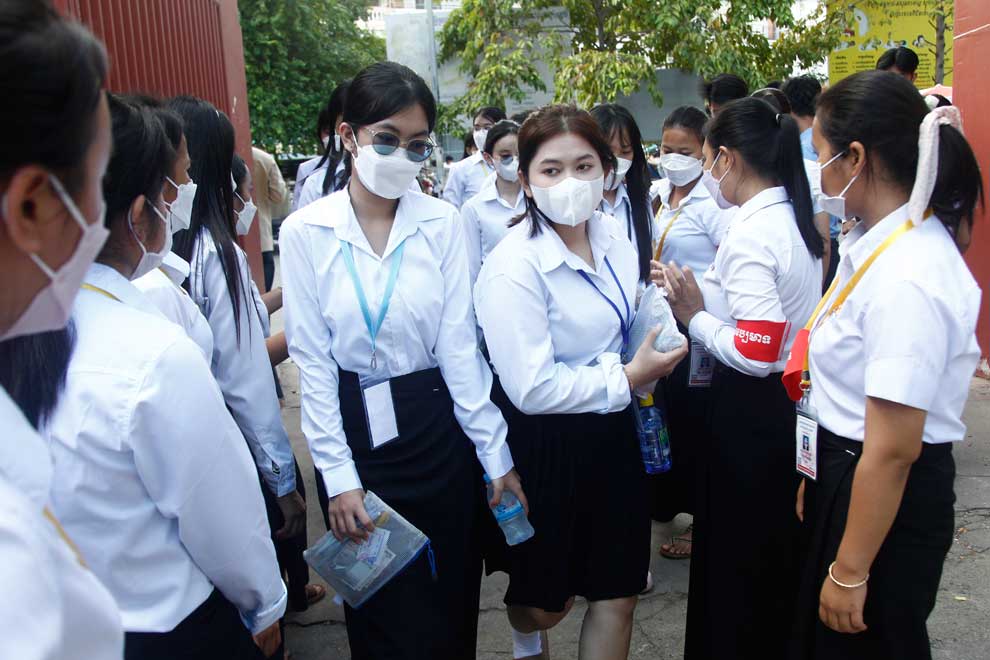
Candidates left Phsar Doeum Thkov High School after their high school exam on December 6 last year. Heng Chivoan
The Ministry of Education, Youth and Sport announced that 90,950 candidates passed December’s high school diploma examinations. Even before the results were released, a number of public and private higher education institutions announced scholarship programmes and pre-enrollment offers for potential candidates.
Whether recent grade 12 graduates or those who are preparing to take the exams this year, it has been noted by a number of observers that many students are hesitant to select a course of study. Many seem unsure as to what kinds of employment will suit their preferred majors.
Lai Sophorn earned the highest honour, an A grade, in last year’s exams. The student from Siem Reap province said that many of her friends were wracked with indecision.
“Many of my friends from high school are unsure what subjects they should select, because they are afraid of studying the wrong skills and finding it hard to find work once they have graduated from university. This problem is not limited to my friends, it is a real issue for many students,” she added.
“I personally don’t have this problem, as I have always known that I want to become a teacher. I will study at the Royal University of Phnom Penh. My parents are poor farmers, but poverty has never been an obstacle to me. As long as we have a goal, we have everything,” she continued.
Seng Unchesdar, a 12th grade student at Hun Sen Champuvoin High School in Phnom Penh, said he is already preparing to take the high school examination. Although he has yet to graduate, he dreams of becoming a designer.
“Though I would like to pursue a career in design, I am not certain whether this will be the path that I go down. I have not yet entered the workforce, so I reluctant to say for sure what I will end up doing. Although I am uncertain, I think that design will allow me to establish a career,” he added.
Ros Soveacha, spokesman for education ministry, told The Pot that he advised students to study their own needs and abilities before selecting a course of study.
“The choice of majors for higher education and skills needs to be made by individuals and their families. This choice will be linked to personal tastes, abilities and the employment market,” he said.
He added that three specialised departments of the ministry – the Department of Higher Education, Vocational Orientation Department, and Department of Youth – had cooperated with the Youth Council of Cambodia to launch a vocational orientation campaign for grade12 students across the Kingdom.
Ouch Cheachanmolika, deputy director of the National Employment Agency of the Ministry of Labour and Vocational Training, said that there are three main areas that students should focus on – technical, language and computer skills. They should also make sure they develop soft skills like teamwork, interpersonal skills and problem-solving.
“The sectors that will demand the most manpower in the coming years are industry and service,” she added.
“The best way for young people to prepare themselves for a career is to make sure they have a clear understanding of themselves, including their interests, values, skills and personalities. It is also important for them to study the job market, so they are aware of present opportunities. They should know how to build their networks and they may need to seek professional and employment counseling services at the National Employment Agency,” she continued.
Sek Socheat, co-founder of the Mindset Development Organisation, told The Post that there were many factors that could lead to indecision by students.
First, it was important that the government established clear policies which provided orientation to students.
If there is not enough support or guidance available, it may make it difficult for students to make decisions and for teachers to provide them with a solid foundation that gives them a clear understanding of the areas of study that might meet their skills or the job market.
He was also concerned that students were not receiving enough guidance from general society. Some students were so torn between different options that they gave up, a serious problem.
“Another factor can be put down to a lack of information. If students cannot easily access all of the information that is available, then they cannot make an informed decision. All of these issues are interconnected, and no one group is responsible for them. We need to work together to address them,” he said.
He added that freedom of education meant nothing if students were unable to decide on a course of study. He encouraged greater discussion by institutions, students and their communities.











